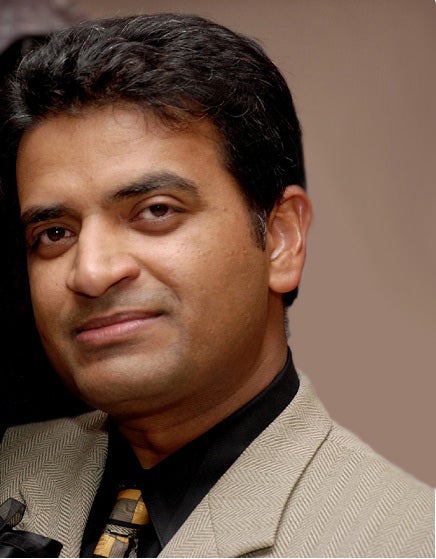
Kaustav Banerjee, professor of electrical and computer engineering at UC Santa Barbara, and director of the campus's Nanoelectronics Research Lab, has won a coveted Friedrich Wilhelm Bessel Research Award from the Alexander von Humboldt Foundation of Germany. He is the first engineering faculty member from UCSB to do so.
Banerjee is one of 18 people, and just five engineers, to be honored for 2011. The prize recognizes exemplary records of research by world-class scientists and scholars whose cutting-edge advancements in their own disciplines are expected to continue –– and to have landmark impact beyond their immediate fields of work. The awards will be handed out later this month at a ceremony in Bamberg, Germany.
"Our campus is delighted that Professor Banerjee's seminal contributions, including research on thermal issues in integrated circuits and nanoscale interconnect solutions, have been recognized with the prestigious Bessel Award," said UCSB Chancellor Henry T. Yang.
"Professor Banerjee is a leader in nanoelectronics, and brings tremendous interdisciplinary knowledge from electrical and computer engineering, as well as from physics and materials, to his innovative research. We also congratulate him on his recent election as Fellow of The Institute of Electrical and Electronics Engineers."
A UCSB faculty member since 2002, Banerjee and his research group work in nanoelectronics, with a current focus on the use of low-dimensional materials such as graphene to design high-performance, energy-efficient "green electronics." His pioneering efforts in 3-D integrated circuits and carbon-based interconnects have played a decisive role in steering the semiconductor industry's research and development efforts.
"My group's research philosophy is to identify and solve important problems whose solutions can lead to significant advances in the field of electronics," he continued. "Our objective is not limited to becoming experts on any nanomaterial, but to innovate techniques and methods that exploit the unique properties of these materials for solving some of the most challenging problems facing modern electronics."
Banerjee and his group are now working to design a quantum device that capitalizes on the interband tunneling phenomenon, as well as the bandgap tunability of nanomaterials, to overcome a fundamental scaling limitation of the widely used transistor known as MOSFET. Banerjee intends to focus further on this endeavor by collaborating with specialist colleagues in Germany –– something all Bessel Award recipients are invited to do for a period of up to one year.
"I would like to thank the Humboldt Foundation for this recognition," said Banerjee, who completed his doctorate at UC Berkeley in 1999 and did postdoctoral research at Stanford before joining UCSB. "I look forward to my stay in Germany, and to collaborating on this topic with some of the best minds in the field."
Young scientists and scholars whose already-pioneering research is expected to continue into the future are eligible for nomination to the Bessel Award. The Humboldt Foundation created the program to honor and attract renowned researchers to Germany for cooperative projects. Banerjee was nominated by German scientist Walter Hansch, a professor at the Institute of Physics, Universität der Bundeswehr Muenchen.
The Bessel prize is valued at 45,000 euros, or approximately $60,000.
The program is financed by Germany's Federal Ministry of Education and Research. The Humboldt network boasts 48 Nobel Prize winners among its ranks.
Related Links
Kaustav Banerjee
Nanoelectronics Research Lab
Friedrich Wilhelm Bessel Research Award
Alexander von Humboldt Foundation



